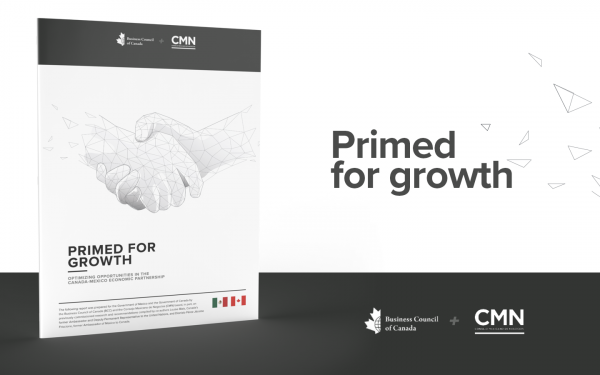Canada’s immigration advantage
A survey of major employers
Foreword
Canada’s success in attracting newcomers from every corner of the globe is one of our country’s greatest competitive advantages. In addition to enriching the social and cultural fabric of our communities, immigrants bring valuable knowledge, skills and experience that contribute to economic growth.
This report sheds light on immigration’s importance to employers and the overall economy. It is based on a survey of 80 member companies of the Business Council of Canada in the first quarter of 2022. Collectively, these 80 companies employ nearly 1,650,000 Canadians in more than 20 industries, generating revenues of approximately $1.2 trillion in 2020.
Close to two-thirds of the companies said they actively recruit workers through the immigration system. The rest hire immigrants who have already relocated to Canada. Among employers that use the immigration system, two-thirds expect to increase their usage over the next three years.
Employers look to the immigration system to help meet a variety of business needs, from enabling enterprise growth to increasing the diversity of their workforces. Above all, immigration helps them fill positions that would otherwise stay vacant. Of the employers that make direct use of the immigration system, four out of five say they do so to address labour shortages.
Employers rely most on programs designed to attract highly skilled workers, such as the Global Talent Stream and the Federal Skilled Worker Program. Employers report that newcomers make important contributions to their businesses, adding that the immigrants they hire tend to possess strong technical as well as human skills.
Nevertheless, some immigrants face challenges adapting to their new environment. Employers recognize these challenges and say they are committed helping newcomers succeed. This includes investing in community settlement organizations, providing language and cultural training, and helping foreign-trained staff obtain recognition of their credentials.
Half of the employers that took part in the survey are in favour of raising Canada’s annual admission targets, in particular for economic-class immigrants. At the same time, employers note that higher levels of immigration should be accompanied by greater investments in the domestic workforce, as well as in childcare, housing, and public transportation.
Despite their overall support for the immigration system, survey respondents say there is room to make it more responsive to Canada’s economic needs. Frustrated by application processing delays, complex rules, and the cost of navigating the system, fewer than a quarter say the immigration system currently serves their business needs well.
These challenges are made more pressing by the accelerating race for international talent. Canadian employers overwhelmingly agree that global competition for skilled workers is likely to intensify as other countries step up their efforts to attract the best and brightest.

Goldy Hyder
President and CEO
Business Council of Canada
Results
Canada’s labour crunch
Skills shortages are widespread: Eighty per cent of surveyed employers are having trouble finding skilled workers. Shortages exist in every province and territory, but are most pronounced in Ontario, Quebec, and British Columbia.
Employers are struggling to fill technical roles. Skills shortages are most common in fields such as computer science, engineering, and information technology. Employers are also struggling to find construction workers, plumbers, electricians, and other skilled trades.
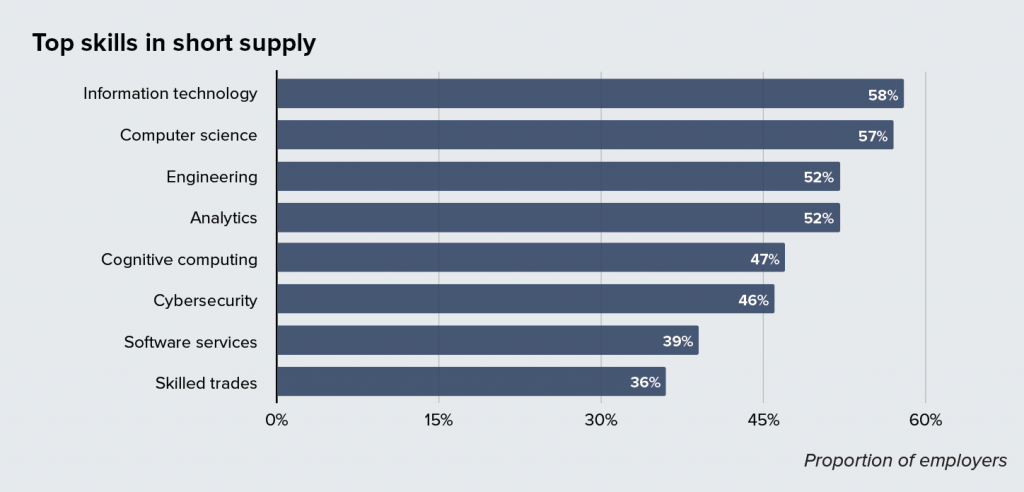
Labour shortages are forcing most employers to cancel or delay projects. Other consequences include foregone revenue, the relocation of work outside Canada, and loss of market share.
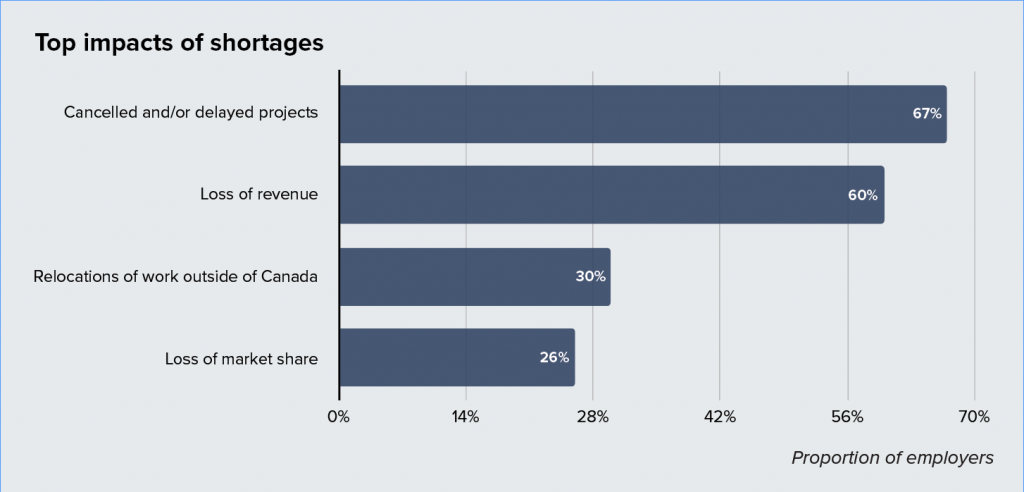
The immigration system is a vital source of skilled talent
Two out of three surveyed employers recruit workers through the immigration system. The rest hire immigrants who have already relocated in Canada.

In addition to addressing labour shortages, immigration meets other important needs. All but one employer in the survey agree or strongly agree that immigration is critical to addressing labour shortages. Employers cite other reasons for using the system as well, such as: the ability to leverage immigrants’ international experience, knowledge, and networks; enhancing workforce diversity; and replacing retired employees.

Employers expect to make increased use of the immigration system. Among companies that currently recruit employees through the immigration system, 63 per cent expect to increase their usage over the next three years. Of these employers, nearly all expect an increase of up to 25 per cent. Anticipated labour shortages are the number one driver of this trend.
Employers are most reliant on programs for highly skilled workers. The programs in greatest use are the Global Talent Stream, the Federal Skilled Worker Program, and the Canadian Experience Class. Almost half of survey respondents also report hiring international students from Canadian post-secondary institutions.

Employers are overwhelmingly satisfied with their international recruits. All but one employer agree or strongly agree that newcomers make important contributions to their business. Of those who recruit through the immigration system, 89 per cent say their international hires have strong technical skills. Seven out of 10 say they possess strong human skills.
What we heard
“Despite adopting strategies such as upskilling to prepare our existing workforce for change, we anticipate growing skill gaps. Immigration helps to close the gaps.”
“The immigration system is critical for us to find highly specialized skillsets that just aren’t available in the Canadian market.”
“Newcomers to Canada are highly adaptable. They are prepared to take on new challenges and are eager to learn.”
Helping newcomers succeed
All employers agree or strongly agree that businesses have an important role in helping newcomers succeed. Support for employees who were recruited from abroad takes many forms, including:
- Training. Most employers offer newcomers training support, including language and cultural training, professional development opportunities, mentoring, and reimbursements for post-secondary tuition.
- Recognition of foreign credentials. Many employers assign newly hired employees to a related, unlicensed position until the newcomer meets the license requirements of the job for which he or she applied. In addition, many firms offer financial support, including paying for the employee’s certifications and paid time off to prepare for and write exams.
- Administrative assistance. Many employers help newcomers navigate immigration processes, such as applying for permanent residency or sponsoring family members to come to Canada.
- Relocation services. Beyond help with moving expenses, many employers provide newcomers temporary accommodation, interest-free loans, and tax advice.
- Community support. Several of the companies in the survey reported working with charities, non-profit groups, and other community organizations that support newcomers to Canada.
What we heard
“We partner with settlement organizations that help newcomers in our community gain meaningful full-time employment through mentorship opportunities, resumé and mock-interview workshops, and career fairs.”
“Canada’s immigration system helps us develop a more diverse workforce.”
“The system provides talent with a global outlook, both in terms of experience and culture.”
Canada’s immigration targets
Half of the surveyed employers think Canada should increase its annual intake of permanent residents. The rest support the government’s current three-year immigration plan. Under that plan, Canada expects to welcome 431,645 permanent residents in 2022, 447,055 in 2023, and 451,000 in 2024.
Employers’ support for higher immigration targets is qualified. Respondents emphasize that new targets should focus on economic-class admissions. Increases should also be accompanied by greater investments in the domestic labour force, as well as in childcare, housing, and public transportation.
What we heard
“Increased immigration is required to offset Canada’s aging workforce and declining birth rates.”
“Affordable housing is a growing issue for Canadians. Unless we increase supply, public support for immigration will soften.”
“It’s not just about increasing the numbers but about making sure that newcomers to Canada have the skills needed by employers.”
“We have over 1,100 job vacancies in Ontario, another 350 in Quebec, 180 in British Columbia, and 100 in Alberta.”
“We need more skilled tradespeople, including general machinists and machine operators.”
“Labour shortages are intensifying in the information technology sector. Job vacancies have increased significantly in the past few months.”
Improving the system
All but two employers agree or strongly agree that global competition for talent is intense and is likely to grow further. Several employers reported that immigration reforms in other advanced economies are contributing to this trend, making it harder to attract and retain top talent.
Fewer than a quarter of respondents say the immigration system currently serves their needs well or very well. However, most employers are undecided as to whether the system serves their needs.

Processing delays are the top barrier experienced by employers when recruiting international talent. Other common barriers include the complexity of administrative requirements, overlapping federal and provincial rules, and the cost of navigating the system.
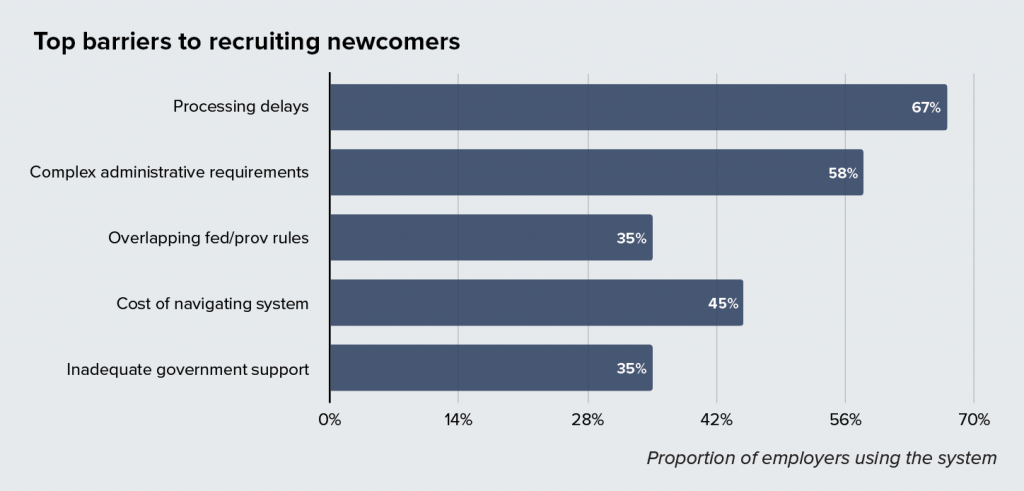
Competition from other countries is the greatest challenge in retaining international talent. Other common barriers include Canada’s relative attractiveness as a destination, difficulties that temporary workers encounter in obtaining permanent residency, and rules that prevent employers from reassigning temporary foreign workers to new job sites or roles.
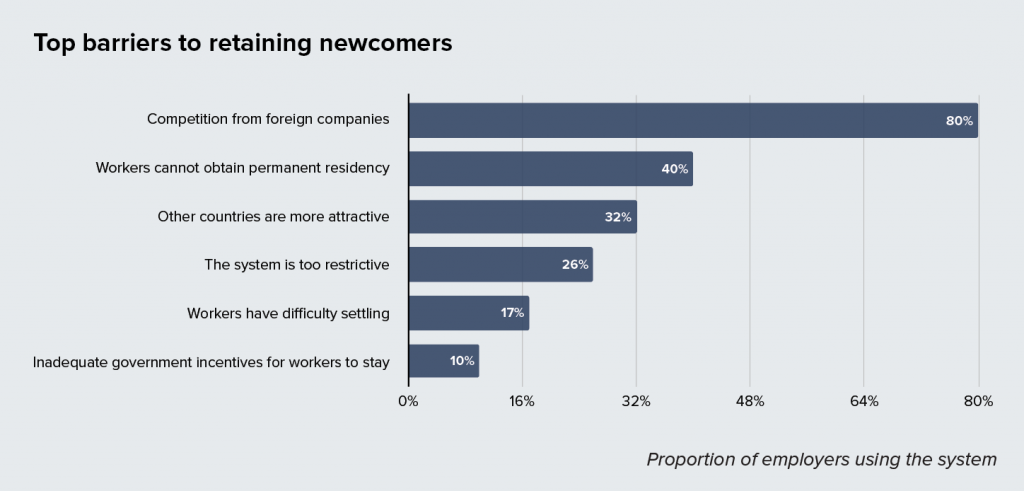
Some employers are experiencing labour shortages but have opted not to use the immigration system. They cite a lack of knowledge of different immigration programs, challenges in having newcomers’ credentials recognized in Canada, and the administrative burden associated with hiring workers from abroad.
Many employers would like to hire more international students. However, they say they are discouraged from doing so by the onerous application process and recent graduates’ inability to obtain permanent residency.
What we heard
“Canada is competing for the same candidate pool as other countries that are adapting their immigration systems to better attract top talent.”
“We would use the immigration system if Canada did a better job of recognizing foreign credentials.”
“We need to give international students more incentives to stay. That includes expediting the work-permit process, making permits more flexible, and reducing the time required to be eligible for permanent residency.”
Methodology
Approximately 170 member companies of the Business Council of Canada were invited to take part in the survey. A total of 80 companies submitted responses via an online questionnaire. Respondents included chief executive officers, chief human resources officers, vice presidents, directors, and managers of human resources. Quotes from survey participants have been anonymized and edited for clarity. Surveyed employers represent the following sectors:
| Sector | Count |
|---|---|
| Agriculture | 1 |
| Automotive | 3 |
| Chemicals/Fertilizer | 3 |
| Consultants/Accounting | 2 |
| Energy/Utilities | 8 |
| Engineering/ Construction/Offshore Services | 7 |
| Financial | 13 |
| Food and Beverage Manufacturing | 2 |
| Food and Drug Retailers | 1 |
| High Technology Manufacturing | 5 |
| Holding Companies/Diversified Financials | 3 |
| Industrial/ConsumerManufacturing | 4 |
| Information Technology | 10 |
| Insurance | 2 |
| Merchandisers | 1 |
| Metals/Mining | 2 |
| Paper/Forestry | 1 |
| Real Estate/Property/Land Development | 3 |
| Services | 3 |
| Telecom/Media | 3 |
| Transportation/Couriers | 3 |











